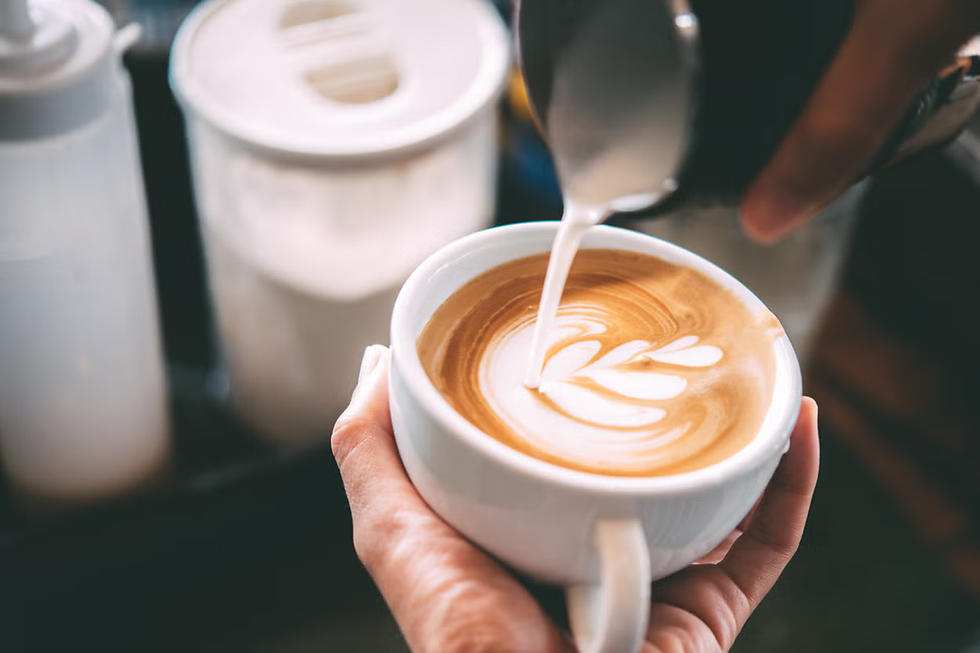Beverages: Baristaphobia Unveiled: Why Nearly Half of Gen Z Are Skipping the Coffee Counter
- InsightTrendsWorld

- Jul 31
- 6 min read
Why It Is Trending: The Rise of Coffee-Shy Consumers
Social Anxiety in Coffee Culture: Increasing shyness and discomfort among Gen Z with in-person interactions at coffee shops spotlight new social behaviors.
Digital Ordering Boom: Delivery apps and online orders are preferred alternatives for caffeine fixes, reshaping how younger consumers engage with coffee.
Home Brewing Anxiety: Fear extends beyond buying coffee to making it for others, highlighting broader social pressures linked to food and drink preparation.
AI as a Surprisingly Popular Solution: A notable minority are turning to AI tools to improve coffee-making skills, reflecting tech-driven coping strategies.
Implications for Coffee Retailers and Brands: This shift challenges traditional café experiences and invites innovation in both digital engagement and product education.
Overview: "When Ordering Coffee Feels Like a Social Hurdle"
Baristaphobia, a newly coined term, describes the fear and anxiety many Gen Z individuals feel about ordering coffee face-to-face at coffee shops. A major survey by Philips shows that almost half of young people avoid going into coffee shops, opting for delivery apps. This social anxiety highlights a significant behavioral shift, driven by generational changes in communication preferences, social pressure, and comfort with technology. The anxiety also impacts social rituals like making coffee for others, with over one-third fearing social repercussions of serving imperfect drinks. Increasingly, Gen Z consumers are turning to AI-driven learning to master brewing at home, reflecting a desire for confidence and control in a private, stress-free space.
Detailed Findings: "What Baristaphobia Means for Gen Z and Coffee Culture"
Prevalence of Anxiety: 47% of Gen Z avoid physical coffee shops, preferring app-based orders.
Explicit Baristaphobia: 7% admit to a specific fear of approaching baristas.
Social Pressure Around Brewing: 38% dread the social consequences of making coffee for others, indicating broader performance anxiety.
AI Adoption for Skill Building: 10% use artificial intelligence tools to learn coffee-making, signaling a tech-savvy approach to overcoming personal challenges.
Shift to Delivery Models: The preference for app orders suggests changes in how coffee retailers must think about customer experience.
Potential Impact on Café Culture: Reduced foot traffic and interaction might challenge community-building aspects of coffee shops.
Key Success Factors of the Baristaphobia Trend: "Bridging Social Anxiety with Coffee Innovation"
Seamless Digital Ordering Experiences: Intuitive apps that reduce friction and anxiety in purchase moments.
Educational Content and Tools: Accessible digital tutorials and AI assistance to empower home brewing confidence.
Socially Sensitive Brand Messaging: Tone and communication that acknowledge anxiety and encourage inclusion.
Alternative Coffee Formats: Ready-to-drink and subscription models providing comfort and convenience.
Community Engagement Beyond Counters: Virtual social spaces and influencer-led interactions to replicate café sociality online.
Key Takeaway: Understanding Baristaphobia Is Essential for Engaging Gen Z Coffee Lovers
Baristaphobia exposes the social discomfort many young consumers feel within traditional café environments, signaling a need for brands and retailers to rethink their engagement strategies. Embracing digital channels, offering educational resources, and crafting empathetic messaging can help brands support this generation’s evolving relationship with coffee, both as a product and a social experience.
Main Trend: The Social Anxiety Shift in Coffee Consumption
This trend highlights how increasing social anxiety among Gen Z influences their coffee consumption habits, pushing them toward digital ordering, home preparation aided by AI, and away from traditional café interactions. It represents a larger cultural movement around social comfort, personalization, and technology-mediated experiences.
Description of the Trend: "Baristaphobia — The Coffee Anxiety Phenomenon"
Baristaphobia refers to the specific fear or shyness of interacting with baristas in person to order coffee. It reflects broader social and psychological trends in younger generations’ approach to consumption, where convenience, control, and reduced social exposure are increasingly valued.
Key Characteristics of the Core Trend: "Coffee Consumption Meets Social Comfort"
High Social Anxiety Among Younger Consumers: Reluctance to engage face-to-face in routine purchasing settings.
Reliance on Digital Ordering Channels: Growth in app usage and delivery preference.
Shift Toward Home Brewing Confidence via AI: Using technology as a coping and learning tool.
Social Pressure Integrated with Consumption: Fear also extends to performing social roles involving coffee, like serving others.
Diminished Café Social Interactions: Potential weakening of in-person communal coffee culture.
Market and Cultural Signals Supporting the Trend: "Brewing Change in Coffee Habits"
Survey Data Highlighting Fear and Avoidance: Nearly half avoid coffee shops due to anxiety.
Rising Popularity of Delivery and Mobile Ordering: Convenience-driven consumer behaviors accelerate.
AI and Tech Tools Adoption: Leveraging technology for skill acquisition and confidence.
Influencer and Social Media Focus on Home Brewing: Popularity of online tutorials and DIY coffee culture.
Broader Youth Mental Health Awareness: Increasing conversations around social anxiety and mental wellness.
What Is Consumer Motivation: "Why Gen Z Shies Away from the Coffee Counter"
Fear of Judgment or Mistakes: Anxiety about being perceived as inexperienced or awkward.
Desire for Control: Preference for managing the coffee experience privately and confidently.
Need for Convenience and Reduced Social Pressure: Digital ordering eliminates face-to-face stress.
Social Anxiety and Introversion Tendencies: Broader personality and mental health factors at play.
Interest in Mastery and Learning via Technology: Using AI and tutorials to build competence.
What Is Motivation Beyond the Trend: "Deep-Seated Social and Psychological Drivers"
Growing Mental Health Awareness: Openness to discuss and address anxiety and phobias.
Changing Social Norms: Comfort with remote communication and reduced interpersonal exposure.
Technological Empowerment: Embracing digital tools as enablers of confidence.
Shift Toward Individual-Centered Experiences: Prioritizing personal comfort over traditional social norms.
Cultural Impact on Consumption Rituals: Redefining coffee as an experience beyond physical venues.
Descriptions of Consumers: "Meet the Baristaphobic Generation"
Consumer Summary:
Gen Z individuals, roughly aged 18–28.
Gender-diverse, generally urban and digitally engaged.
Typically middle-income bracket with lifestyle shaped by high social media use and mental health awareness.
Often introverted or socially anxious, valuing privacy and control in daily rituals.
Tech-savvy and open to learning through innovative digital aids.
Interested in wellness, personalization, and convenience.
Tend to engage with coffee more as a functional necessity or personal treat than a social ritual.
How the Trend Is Changing Consumer Behavior: "From Counter Conversations to App Clicks"
Shift from in-person coffee ordering to mobile and delivery platforms.
Increased demand for informative content and guided home brewing help.
Reduced reliance on café visits for social interactions.
Growing acceptance of technology as part of everyday lifestyle and learning.
Changing loyalty dynamics favoring brands that offer convenience and empathy.
Implications of Trend Across the Ecosystem: "Brewing New Strategies for Coffee Industry Players"
For Consumers: More accessible, low-pressure coffee experiences tailored to social comfort.
For Brands and CPGs: Opportunity to innovate with digital platforms, tutorial content, and convenient product formats.
For Retailers: Need to integrate omni-channel approaches combining physical and digital presence.
For Baristas and Café Operators: Potential need for more empathetic customer approaches and alternative engagement models.
Strategic Forecast: "Innovation and Empathy Driving Coffee’s Next Phase"
Expansion of delivery and app-based order systems.
Development of virtual barista and AI-coached home brewing assistants.
Increased content creation around confident coffee preparation and education.
Café model adaptations focusing on low-pressure social environments.
Collaboration with mental health advocates to address social anxiety in marketing.
Areas of Innovation: "Tech and Experience Innovations to Beat Baristaphobia"
AI-Powered Brewing Coaches: Interactive tools helping users learn at their own pace.
Seamless App-Based Ordering Interfaces: Reducing friction in purchase journeys.
Virtual Barista Interactions: Chatbots or video guides to mimic café sociality.
Subscription and Ready-to-Drink Offerings: Minimizing need for in-person visits.
Social Media Campaigns Normalizing Anxiety: Encouraging openness and building community support.
Summary of Trends:
Core Consumer Trend: “Baristaphobia” — social anxiety shaping coffee consumption behaviors.
Core Social Trend: “Digital-First Social Comfort” — preference for low-pressure, tech-enabled interactions.
Core Strategy: “Empathy and Convenience” — brands addressing mental wellness with accessible solutions.
Core Industry Trend: “Omni-Channel Innovation” — blending physical and digital customer journeys.
Core Consumer Motivation: “Control Over Social Exposure” — balancing ritual enjoyment with comfort and confidence.
Final Thought: "Baristaphobia Beckons a New Coffee Culture"
Baristaphobia reveals a profound cultural shift where coffee consumption is increasingly intertwined with mental health and social comfort, especially for Gen Z. For brands, retailers, and cafés, embracing technology, empathetic messaging, and innovative formats will be key to reconnecting with this generation. By redefining coffee as both a personal and social experience on their own terms, the industry can foster deeper loyalty and inclusivity in a changing world.





Comments